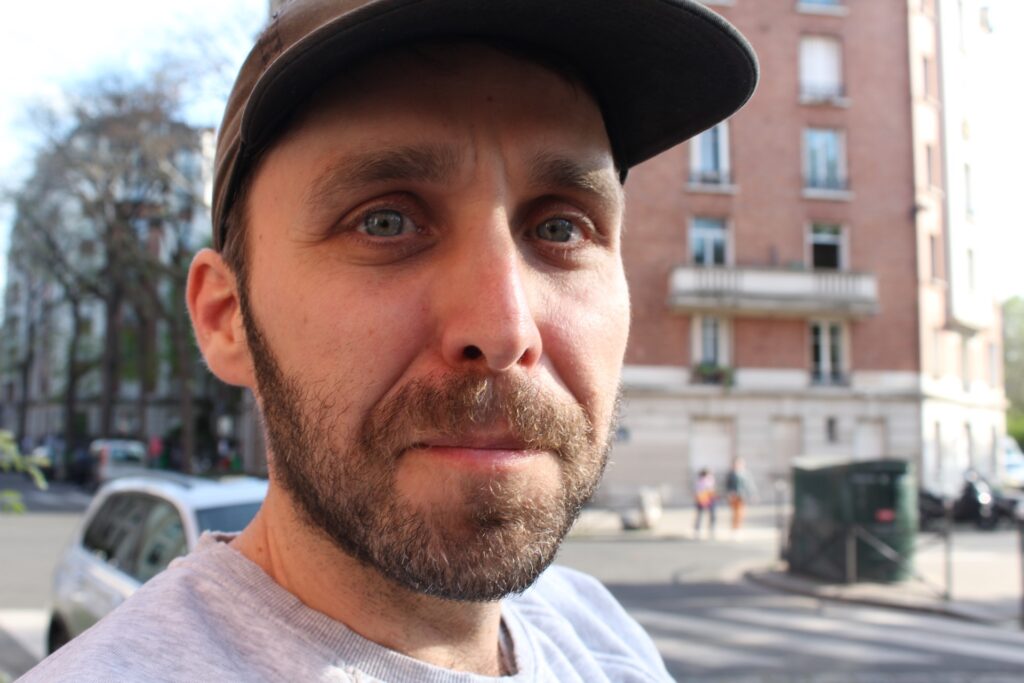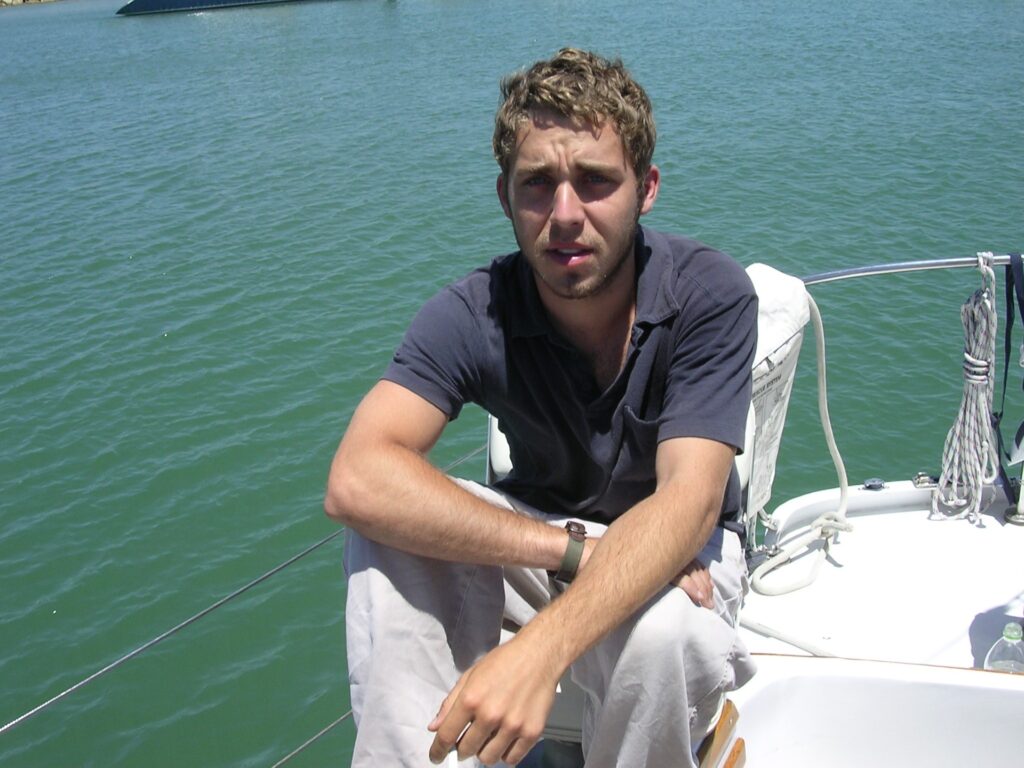
Photo of Chris Knapp courtesy of Lya Calvet
Editorial intern Rose Saint-Clair ‘25.5 talks to former NER intern and current author and journalist Chris Knapp ’07 about discipline, literary misbehavior, and applying journalistic ethics to fiction writing.
Rose Saint-Clair: Where are you now, geographically and professionally?
Chris Knapp: I’ve been in Paris since 2017, and more specifically, in the 20th arrondissement, within spitting distance of my wife’s childhood home. It’s a corner of the city that Americans seldom visit, but when I say I love Paris, what I mean is I love our neighborhood—the sense of community, the pace of life, the shared local history. It’s maybe a bit corny to say, but it feels to me like a great honor to partake in it all.
Professionally, I’m currently working on a long investigation into the use of a dangerous pesticide in the French West Indies. In the fall, some colleagues and I were awarded a grant from Journalismfund Europe and spent five weeks reporting in Guadeloupe and Martinique. Now, the results of that trip are coming out in Italian, Spanish, and English, and meanwhile, we’re still reporting, and making arrangements for another trip to the Caribbean in May.
RS: What inspires your writing?
CK: The most interesting human drama to me is the kind you find at the intersection of conflicts on various scales—interpersonal, political, historical, et cetera. But in a way that describes all drama, and maybe what I mean is just that it’s energizing to see, and to try to articulate or dramatize, how these conflicts interact. The critic James Wood wrote somewhere that the best fiction—in this case he meant Chekhov—shows us the prison and the key in the same object or phenomenon, and I think these intersections of conflicts offer interesting opportunities to do just that; we live our lives in this maelstrom of forces so much bigger than us that they seem to inescapably determine our fates, but the difficult task of untangling these forces and decrypting them gives us a way to rewrite our futures, individually and collectively. The beauty of that struggle, the kind of strength and growth and courage it requires, whether we succeed or not, is itself a kind of freedom, and exactly the kind I like to write about.
RS: While working on your MFA at the University of Virginia, you taught an introductory creative writing class. What did you learn from teaching craft to undergrads?
CK: Oh gosh, I miss teaching creative writing for a lot of reasons, and one of those is how much you learn when you do it. First of all, you have to be able to precisely articulate the most basic mechanics of fiction writing, plot and characterization and so on, to identify them in student work as well as in the published work you assign as reading. Constantly asking yourself why a moment in someone else’s fiction works or doesn’t becomes a habit of mind you bring back to your own writing, which you might otherwise neglect to think of in those terms.
But another crucial takeaway from teaching, for me, was that no matter how seriously you take it, and how good you are at it, writing creatively and submitting your work to the judgment of others, is—if I can be a little woo-woo here for a minute—good for the soul, in the sense that it requires a degree of sensitivity, vulnerability, and humility that you can put to good use in the rest of your life.
RS: You worked on the Middlebury Campus while at Midd and continued with journalism while in France, earning a joint MA in journalism and international affairs. How has practicing this style of writing shaped your fiction?
CK: Around the time I started writing my book in 2014 or 2015, the entire enterprise of sitting at a desk making up people and telling stories about their little lives had begun to seem hopelessly precious, as it had for a lot of writers around that time, I think. Nonfiction felt much more urgent—narratives and analysis of real events and the real people affected by them. There was a lot of conversation in the fiction world at that time about who had the right to tell which stories, who had the right to inhabit which points of view. Those arguments resonated with me, so that was another thing that attracted me to journalism: the question of whether you have a right to tell a story could only be answered at an extremely local level, by the individuals rather than the communities to whom that story belonged, who could decide for themselves whether or not to entrust it to you. It’s a huge responsibility, and a huge honor, to earn that trust. My disillusionment with making things up at my desk didn’t last, but a lot of the ideals and ethics around writing nonfiction did, and have found their way into my fiction.
RS: In what setting did you learn the most at Middlebury? What was it that you learned?

CK: My senior year at Middlebury, I lived in an apartment above Taste of India in town, and worked as a waiter at Two Brothers Tavern. The previous three years had been transformative for me, but they’d also taken place in a bubble. Living off campus was the first glimpse I had of what living in the adult world entailed, and of how difficult it would be to balance the demands of that world against the demands of an urgent creative pursuit. In that rather dingy apartment, long before I wrote anything worthwhile, I developed an internal discipline without which it would have been impossible to claim I was serious about writing, let alone to actually get any writing done in the years that followed. When I moved to Brooklyn and started bartending, I didn’t know if I was any good (I still have my doubts!), but I knew I could keep my ass in the chair and pound the keys.
RS: What was the biggest takeaway from your experience as an NER intern?
CK: Oh, so many takeaways. Maybe all contained in the lesson that literature, and even just words, are serious business. Carolyn was an excellent model of that seriousness, as was Stephen Donadio, who was editor at the time. Just this past fall, I ordered Benjamin Dreyer’s style guide, Dreyer’s English, thinking it would be a decent desk reference for when I didn’t want to haul out the Chicago Manual. I picked it up to skim through the introduction when I got home, and ended up reading the whole thing straight through. Not so much because there was new information in it—in fact there was very little I hadn’t already learned from Carolyn—but because it gave me a terrific feeling that I remembered from the NER offices: the exhilaration of being in company for whom no detail related to the written word, however minute, was trivial.
I think Carolyn may have regretted imparting this lesson when, years later, she published my first short story. I’d never been edited before, and I was on a long train ride with nothing else to do, and now I blush to think of the disquisitions I composed in track changes on why I wanted to, for example, keep a comma she’d marked for deletion. But she’s the one who taught me to care so much!
And a more important aspect of the seriousness Carolyn and Stephen modeled was an investment in testing literature’s boundaries. My sense of what literature could or should be until that point was pretty conservative, and I don’t think I expected to find at NER, in the staid hills of central Vermont and the (forgive me!) fairly vanilla culture of Middlebury College, anything to shock or dislodge that sensibility. But I remember Carolyn gave me a story to proof, it was called “Exeunt” by Roy Kesey, and it opened with a line about “the birds catching on fire again,” something to that effect. It was thanks to, and not in spite of, the formal daring of that piece, and the daring of its surreal imagery, that gave it an emotional heft on par with anything else I’d ever read. I felt proud to be part of the magazine that had selected it. And published it alongside Virgil! Literary misbehavior, let’s say. I’d learned about it in class from excellent writers like Rob Cohen, but NER was the first place I encountered it in the real, contemporary world, where I hadn’t thought it would fly.
RS: Have you ever experienced burn out? If so, how did you continue writing through it?
CK: I’m starting to wonder if I’ve ever not experienced burnout. But in truth it’s only the past few years, during my time at Sciences Po and now the reporting project I’m in the middle of, that I’ve truly been riding that hairy edge of total collapse. It’s a scary feeling, and my own instinct—though I think mental health pros would agree—is that the only way back is not to ask yourself questions that contain the phrase “keep working.” Giving yourself permission to rest and recuperate is its own challenge, and doing nothing is taxing in its own way. You have to find low-impact ways to stay active, things that require focus but not much emotional or intellectual investment. Things like jigsaw puzzles, cooking, cleaning. Best to avoid anything that could be described as “content,” but there are plenty of TV shows/movies that aren’t too challenging but also aren’t so dumb they don’t absorb your attention. I love to sweep, or even mop, when things are bad. Then when you start to come back to yourself, you find your brain has been doing all this creative work in the background and is ready to get started on something new.
RS: What are you most curious about right now?
CK: I’m still deep in the reporting project I mentioned above, and I don’t want to say too much about it, but at the moment it’s absorbing most of my curiosity. It’s also collaborative work, and it’s really rewarding and exciting to be able to share that curiosity with my teammates (reporters Juli Simond and Giada Santana, and photographer Eddie Stok) in real time. It has me curious about the prospect of collaborating on a more creatively oriented project—a narrative podcast, a TV script, who knows. But it also has me craving the solitude of fiction writing, and I’d like to explore new possibilities in that realm as well. Maybe sci-fi!